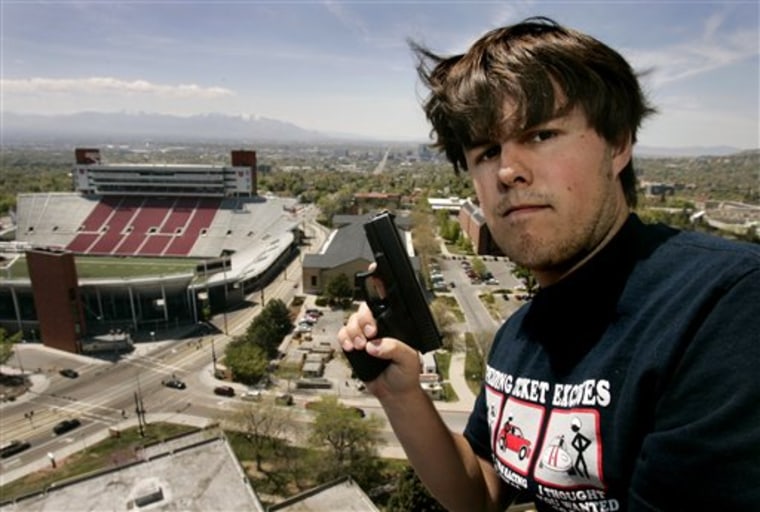Brent Tenney says he feels pretty safe when he goes to class at the University of Utah, but he takes no chances. He brings a loaded 9 mm semiautomatic with him every day.
"It's not that I run around scared all day long, but if something happens to me, I do want to be prepared," said the 24-year-old business major, who has a concealed-weapons permit and takes the handgun everywhere but church.
After the massacre at Virginia Tech that left 33 dead, some have suggested that the carnage might have been lower if a student or professor with a gun had stepped in.
As states and colleges across the country review their gun policies in light of the tragedy, many in Utah are proud to have the nation's only state law that expressly allows the carrying of concealed weapons at public colleges.
"If government can't protect you, you should have the right to protect yourself," said Republican state Sen. Michael Waddoups.
Utah legislators and law enforcement authorities said they knew of no modern-day shootings at the university. But one lawmaker cited a shooting rampage in Mississippi in 1997 as an example of how allowing others on campus to arm themselves can improve safety: After a teenager shot two students to death at Pearl High School, an assistant principal chased the gunman down outside and held him at bay with a .45-caliber pistol he kept in his truck.
Nationwide, 38 states — including Virginia — ban weapons at schools. Of those, 16 explicitly prohibit weapons on college campuses, according to the National Conference of State Legislatures. In other states, each school is allowed to formulate its own policy.
University lost court case
For decades, the University of Utah banned concealed weapons.
"Our view was that there was an increased risk of both accidental and intentional discharge of a firearm if more firearms are present," said spokesman Fred Esplin. "It was a matter of safety."
But in 2004 the Legislature passed a law expressly saying the university is covered by a state law that allows concealed weapons on state property. The university challenged the law, but the Utah Supreme Court upheld it last year.
Utah is easily one of the most conservative states, and the Legislature is dominated by Republicans, many of whom have a libertarian streak. Utah has no motorcycle helmet law, for example, and there is strong affection for the Second Amendment.
The carrying of guns at the university worries students like Timmy Allin, a freshman on the tennis team from Dallas who feels safe on the 28,000-student urban campus. Allin was not aware weapons were allowed on campus until told by a reporter.
"I don't see the need for one up here, so that could only lead to trouble," he said.
Lawmakers point to a recent shooting at a downtown shopping mall as evidence that concealed weapons prevent additional deaths.
Armed with a shotgun and a pistol, 18-year-old Sulejman Talovic randomly shot nine people at Trolley Square, killing five, on Feb. 12. He died in a shootout with police. An off-duty Ogden police officer carrying a concealed weapon — in violation of mall policy — pinned down Talovic with gunfire until other police arrived.
"Thankfully that officer disobeyed the rule of Trolley Square of having no guns," GOP state Rep. Curt Oda said.
Oda said banning guns on campus might do more harm than good. He said people bent on violence might resort to other, perhaps bloodier methods, such as swords.
"A person that's got skill with a sword in a very big crowd could put a lot more people down with a sword than a gun," he said. "They're silent. You'll have people screaming, but nobody knows what's going on."
Draw the line at dorms?
Some of those who work at the University of Utah said they feel more secure because concealed weapons are allowed.
"What happened at Virginia Tech might have been stopped," said Christine Zabawa, a medical researcher at the university. However, she said it is a bad idea to allow guns in dormitories, and fears an accident could happen during a party on campus.
"Alcohol and guns. It's a bad combination," she said.
Justin Ligon, 23, a Virginia Tech student and vice president of the school's Pistol and Rifle Club, with about a dozen members who do their shooting at a public firing range, said the Blacksburg, Va., university should drop its prohibition on guns.
He said it is unlikely that bringing guns on campus would make school more dangerous.
"People with those permits, they go through a background check," he said. "Generally the people who go through that trouble aren't people who are gong to fly off the handle and do something dangerous."
